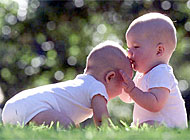Luca and Laura top list of favourite names

A child born in Switzerland today has an excellent chance of being called "Luca" if he is a boy, and "Laura" if a girl, confirming that children's names go in and out of fashion almost as often as consumer goods.
In 1999, the most recent year for which statistics are available, around 1,200 Swiss boys were named either Luca or Lukas. The second most popular choice was Marco or Marc, which was given to about 700 newborns.
For girls, Laura topped the list – about 700 girls were so christened. If “Lara” is added to that total, it rises to over 1,000. Another 785 girls were called Sara(h).
Statisticians consider name “common” if it is given to between 1.5 per cent and three per cent of babies born in a particular year. Names rarely remain that popular for more than a couple of years.
Indeed, the variety of names given to newborns in Europe and the United States has increased enormously in the past 30 years. Until the 1970s, for example, “John” and “Mary” were the most popular names for American boys and girls. By 2000, John had dropped to 21st place while Mary had fallen all the way down to 81st place.
The US has been keeping track of naming patterns since the 19th century, but Switzerland has only been collecting data since 1987.
However, a glance at the obituary notices in Swiss newspapers reveals that parents’ preferences for names have changed dramatically over the decades. Before 1940, Swiss children were typically burdened with names like Walter, Fritz or Ernst, and Mina, Elsa or Albertine.
Since 1987, the Swiss have opted for Sara/Sarah, Stefanie/Stephanie, Laura/Lara, Mélanie, Céline/Selina, Sabrina, Jessica, and Sandra.
Recently, in French-speaking Switzerland, the name Léa has become the most popular, while German speakers are partial to Michelle. The number of babies called Julia (together with Julie and Giulia) has also skyrocketed in the past year or two.
For Swiss boys, the favourite names during the past 14 years have been Marco/Marc, Michael, Luca/Lukas, Fabian/Fabio, David, Simon, Kevin, and Patrick. In the French-speaking cantons, Alexandre and Nicolas are the present favourites, while Jan is very high on the list among German speakers.
One discernible pattern has been the decline in Germanic names. Today, there are hardly any Gottfrieds or Ulrichs – instead the names come from Hebrew (Michael, David, Simon, Jan), Latin (Marco, Lukas, Fabio, Patrick), Greek (Alexandre, Nicolas), and Irish (Kevin) – of all things.
The popularity of “Kevin” in Europe and America around 1990 is one of the few trends that sociologists can actually explain, because its rise clearly coincides with two things: the release between 1987 and 1992 of five movies starring Kevin Costner, and the success in 1990 and 1992 of the two “Home Alone” movies, which featured a young boy called Kevin.
Generally, however, name trends are not easy to explain. Why, for example, did the boy’s name, Dylan, which was hardly known in French-speaking Switzerland in 1987, become the region’s second most popular name in 1996?
It’s the same story with the name, Océane. In 1987 not a single baby girl in French-speaking Switzerland was so christened. Yet in 1999, Océane ranked 11th in the list of the region’s most popular girls’ names.
Perhaps nothing shows more clearly how naming patterns have changed than a glance at the family tree of a patrician Bernese family, the von Erlachs.
Since the 13th century this family produced generations of men and women named Johannes and Johanna, Hans and Anna, Rudolf and Katharina, and Franz and Maria.
However, since 1980 the von Erlachs have plumped for the names Kevin, Stefanie, and Laura. Obviously, even 800 years of tradition can’t compete with the attraction of trendy names.
by Kim Hayes

In compliance with the JTI standards
More: SWI swissinfo.ch certified by the Journalism Trust Initiative








You can find an overview of ongoing debates with our journalists here . Please join us!
If you want to start a conversation about a topic raised in this article or want to report factual errors, email us at english@swissinfo.ch.